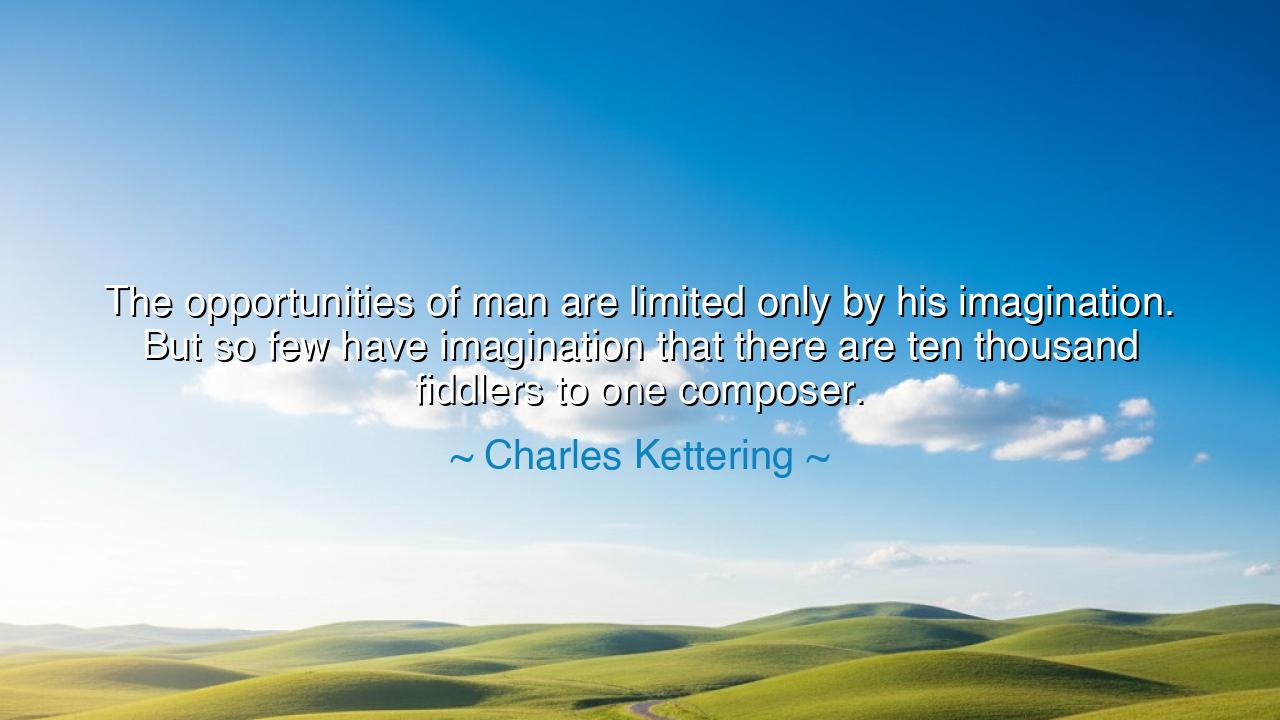
The opportunities of man are limited only by his imagination. But
The opportunities of man are limited only by his imagination. But so few have imagination that there are ten thousand fiddlers to one composer.






The Song of Creation: On Imagination and the Rarity of Vision
Hear now, O seeker of wisdom, the words of Charles Kettering, the inventor and philosopher of the modern age: “The opportunities of man are limited only by his imagination. But so few have imagination that there are ten thousand fiddlers to one composer.” In this saying lies the lament of every age — that though the human spirit was born with the power to create worlds, few have dared to use it. Imagination, that divine spark, is the fountain of invention, yet it burns bright in only a few souls who dare to dream beyond imitation. Most men are content to repeat the songs of others, while only the rarest compose new melodies for the future.
Kettering, whose inventions transformed the twentieth century, spoke these words not as a poet but as a maker — one who understood the difference between mechanical skill and creative vision. He was the mind behind the electric starter, freeing humankind from the labor of the crank; he advanced the science of fuels, lighting the path for generations of innovators. Yet even surrounded by genius, he saw that few possessed the courage of imagination. Many could build what already existed, refine what others had made, or follow what was proven — but few could dream something truly new. Thus his words ring as both revelation and reproach: that the world teems with fiddlers, but starves for composers.
The fiddler, in Kettering’s vision, is not without talent. He plays beautifully, but he plays what has been written. His skill is precise, but his purpose is small. He is safe, admired, and predictable. The composer, however, ventures into silence — into the unknown. He must create where no song exists. His instrument is not only his hand but his imagination, which dares to draw harmony out of chaos. He risks failure, ridicule, and loneliness, for his work cannot yet be understood. But it is the composer, not the fiddler, who expands the world’s horizon. Every civilization has been shaped by such composers — by those who refused to play the old tunes of comfort and instead dared to write the music of tomorrow.
Consider the tale of Thomas Edison, who, like Kettering, believed in the boundless power of imagination. Before Edison, the world was lit by gas and candlelight, bound to the rhythm of darkness. Yet he imagined light that would never die, a fire captured in glass. He failed a thousand times — and still he pressed on, hearing a symphony in the silence of his own vision. The fiddlers around him said, “It cannot be done.” The composer within him said, “It has already begun.” And when the light finally came, it illuminated not only homes and streets, but the human capacity for creation. So it is that imagination becomes not merely a gift, but the seed of transformation.
Yet Kettering’s words strike deeper still. He saw that most people, though capable of imagination, bury it beneath fear, habit, and doubt. Society rewards those who conform, not those who question. To imagine is to rebel against limitation; it is to stand against the ordinary. The fiddler fears the silence before the song, for in that silence he must listen to himself — and the world has taught him not to trust his inner music. Thus, imagination dies not from lack of ability, but from lack of faith. It withers when we mistake imitation for mastery, obedience for wisdom.
But for those who dare to awaken the imaginative spirit, the possibilities are infinite. The dreamer sees paths where none exist, bridges where there are only abysses. Imagination is the fire that turns obstacles into opportunities, despair into creation. It is the power that makes the poor rich in mind, the powerless mighty in vision. Every great revolution, every art, every discovery begins with one who refused to play the notes handed to him and instead composed his own. The future belongs not to the many who echo, but to the few who imagine.
So, O listener of the eternal song, take this lesson into your heart: cultivate your imagination as you would tend a sacred flame. Do not fear to dream differently, for the world’s progress depends upon your courage to compose. Train your skill, yes — but let skill be the servant, not the master, of imagination. When you encounter silence, listen; when you meet resistance, create. Be not one of the ten thousand fiddlers content to repeat the past, but one of the few composers who write the music of the age to come.
Thus, as Charles Kettering teaches, the opportunities of man are as boundless as his vision, as infinite as his courage to dream. The world waits, even now, for new composers — for those who will hear the unplayed notes of destiny and dare to bring them forth. Let your imagination rise above imitation; let your life be not a repetition, but a symphony. For though ten thousand may play the old song, it takes but one voice of imagination to change the tune of the world forever.






AAdministratorAdministrator
Welcome, honored guests. Please leave a comment, we will respond soon